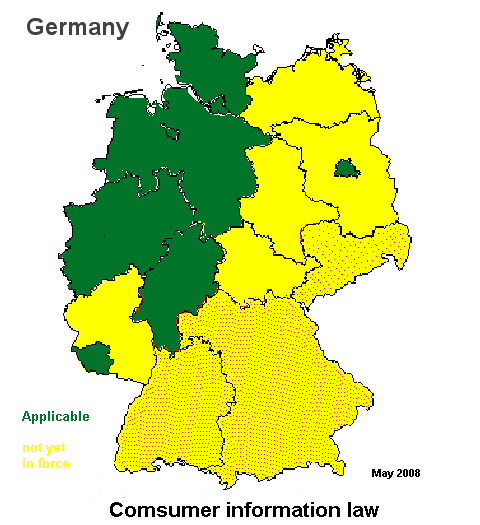
GERMAN NEWS: 17. May 2002, Article No. 4:
| Consumer protection guaranteed |
| For the first time in Germany, consumers shall soon
be guaranteed the right to information about food and
certain other products. Despite opposition by the CDU and
the FDP, the Bundestag passed the Consumer Information Act
[Verbraucherinformationsgesetz], which was a central reform
project of the Red-Green Coalition. The law is scheduled
to go into effect in January; however, it's still
uncertain whether the Bundesrat will approve the law.
According to the law, federal, state and regional
authorities will have to allow consumers unrestricted
access to information about food and some consumer goods.
|
Unfortunately the conservative CDU/CSU majority of the Upper house (Bundesrat) did not approve the law.
Therefore it took 4 years for the next trial which was stopped by the president:
|
13. December 2006, Article No. 7
|
| Criticism of German President Koehler |
| There is increasing displeasure within the Grand
Coalition government over German President [titular head
of state] Horst Koehler. Following the example of leading
CDU/CSU politicians, the SPD has now also distanced
itself from Koehler after he refused to sign a government
bill [which is necessary for it to come into effect as
law]. SPD caucus manager Olaf Scholz accused Koehler of
having overstepped his authority by vetoing the Consumer
Information Law. Scholz's CDU/CSU counterpart, Norbert
Roettgen, had earlier expressed similar sentiments.
Chancellor Angela Merkel, meanwhile, via a spokesman,
indicated that any lectures directed at Koehler must
cease. |
| 19. December 2006, Article No. 4
|
| Koehler explains his veto of the consumer
information law |
| German President Horst Koehler has explained his
reasons for stopping the consumer information law. The
intended transfer of duties to municipal authorities was
violating the constitution, Koehler wrote parliamentary
president Norbert Lammert. After the federalism reform,
the states must transfer federal tasks to municipalities
but not the federal government. Koehler had been
criticized for stopping the law on obligatory information
of authorities in case
|
| Mo, 25. 12. 2006, Article No. 3
|
| Calls for improved coordination among President
and Parliament |
| Berlin. The vice president of the German Bundestag,
Thierse, issued a call for improved coordination among
Germany's President and Parliament. The background are
two planned legislations drafted by the Grand Coalition
the head of state refused to sign over the past few
months. Thierse stated that a large number of lawyers had
examined the Consumer Information Law, for example,
during the parliamentary proceedings. Koehler's veto,
however, caused public malice of the Bundestag and the
German government, a difficult constellation. Koehler had
refused to sign the Consumer Protection Legislation, and
the legislation concerning the privatization of air
traffic control for constitutional reasons.
|
| 04. April. 2007, Article No. 3
|
| Cabinet approves revised Consumer Information Law |
| Berlin. The federal Cabinet has approved the
corrected version of the Consumer Information Law. German
President Horst Koehler had refused to sign the original
bill [thus preventing it from coming into effect] in
December, due to reservations he had about its
constitutionality. He saw it as violating provisions of
the federalism reform package because it allowed the
federal administration to require municipalities directly
to provide certain information. The revised version has
the state-level governments as middle-men; otherwise,
there are no substantive changes. It obliges authorities
to disclose violations of food laws or threats to
consumers' health, and to name the companies involved. It
also allows consumers to inquire what government agencies
know about specific food products. The new Consumer Information Law has been sharply criticized by the Opposition in Berlin. Even though the bill was re-worked over a four-month period, its fundamental problems have not be fixed, said Green Party politician Ulrike Hoefken. She told RBB radio that, for example, the release of information could easily be refused by calling it a 'trade secret'. The FDP was also critical. The Federal Association of Consumer Groups complained that food companies are exempt from the disclosure obligation.
|
|
21. September. 2007, Article No. 3
|
| Upper House (Bundesrat) passes Law on 'Consumer
Information' |
| The Upper House (Bundesrat) passed the 'Law on Consumer Information' that will provide the buyers with information concerning the risks risks of foodstuffs, cosmetics, garments and toys. Apart from that, the names of blacklisted companies need to be made public when expired/rotten meat had been sold or pesticide thresholds breached. Critics think the law does not go far enough, as companies concerned could claim that the information was commercially sensitive - except where there were acute health risks or offences had been committed. |
The 'Law on Consumer Information' was published in the Law gazette (BGBl. I S. 2558) 5. November 2007 and went into force 1. May 2008 in the federation and approx. 8 of 16 states.
Bonn, 8 April 2008: Report of the Federal Commissioner for Data Protection and Freedom of Information:
In addition to the Freedom of Information Act (in federation and 9 states) also the Environmental Information Act (UIG) and the Consumer Information Act (VIG) grant citizens the right to information in connection with the public administration. However, the separation of these claims is very difficult and its conditions and the respective procedures are different. Therefore, it would serve the interests of persons and of freedom of information if a harmonisation could be achieved.
Appendix:
[Walter Keim v. Germany] [Freedom of Information] [Petitions] [FOI as Constitutional Right] [Constitutional complaint] [Administrative court case] [Human rights] [Homepage]
Colours on picture: dark green: FOIA enacted. Yellow: pending law. FOIA= Freedom of Information Act